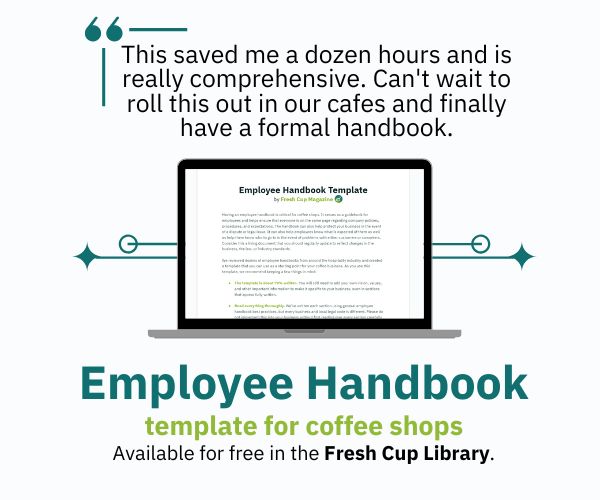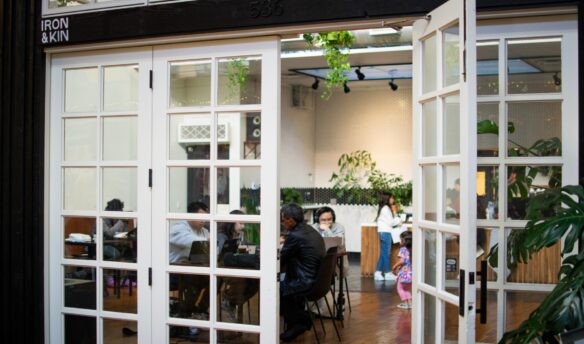[M]ay all who enter as guests, leave as friends.” This quote is written on a wall that greets my staff as they arrive to work. I have owned Silk Espresso in Gresham, Oregon, since 2005, and my desire from the beginning has been to foster a culture between these walls that has the feel of your favorite living room. As I look back over the last eight years, there are many ways the culture at my shop is unique, but four are key: coaching, communication, character and care. These qualities make up what I call our “living room effect,” an atmosphere that is pleasant for both staff and customers to spend time in. This approach has worked wonders for our store, and I sing its praises to as many people as I can, both in this industry and beyond.
At the core of our culture is our development program. Silk is fortunate to be a wholesale retailer for Stumptown Coffee Roasters. My employees are asked to complete six courses with a trainer at Stumptown headquarters during their first year with us. When they successfully complete the program, a custom-made Reg Barber tamper is theirs to keep. This program exposes my staff to some of the most knowledgeable trainers in the coffee world, and most of them come away from the program with a greater passion for this industry and a better understanding of their place in it. Like any great coaching system, our development program motivates our baristas to keep learning even through mistakes, and to challenge themselves daily with new skills.
[I] know that many café owners—me included—assume that our ship runs better with us at the helm. I have learned that not only is this false, but that sometimes by making myself the only portal for communication, I am in the way more often than I am helping. I’m very hands-on with my business and am guilty of spending a lot of time here. Even though I come through these doors every day, the truth is that I don’t have to. I’ve learned that by communicating well in two areas, I can step away from my café and watch it thrive. I use an old-school clipboard to keep the daily ebb of goods and commerce on track. It has a flow chart with chores, deliveries, payments and activities for each day. Everything is color-coded—for example, if the activity is green, the delivery is COD and the driver will expect cash from the till. Orange means terms, and the payment will be mailed. Blue means there’s a check cut and waiting. Chores are divided by shifts. The goal is to communicate so well that surprises become rare. Also on this clipboard is an inventory sheet with average pars (minimum amounts) listed for every item we use per week. Ordering should never be a mystery. Even the shopping list for the local grocery store is typed up according to the floor plan of the store—each column lists the items in that aisle in the order they appear on the shelves. My well-worn clipboard ensures that should I fall off the face the earth tomorrow, my people will still be set up to succeed.
Thanks to the digital age, communication keeps getting easier. In the last two years I have taken our cash register, time sheets, communication log, punch cards, coupons, loyalty program and all of our marketing completely digital. While this has saved me heaps of money, it has also saved me time (my favorite currency) and has streamlined my branding efforts. My brand is no longer caught in the noisy traffic of coupon and Web-based marketing. Smartphones and digital marketing mean my business is at my fingertips and my brand is never far from the palm of my customers’ hands. Some apps that we swear by for iOS devices include Clocca, CloudOn, Square Payment, Square Register, Facebook, Twitter, Instagram and Paperless Punchcard.
Streamlined communication means that work becomes less about the work and more about the people. Minimizing surprises and mystery in the business brings an ease to the workplace and allows the focus to be on great service. This is the living room effect. Communicating well also means that I can stay connected to my business and fully support my people, but my presence is not required.
[R]ecently I was asked how I always seem to find devoted employees. There is no secret formula—I hire on gut feeling, or on a hunch. I do not have a long list of requirements or interview questions for new hires. I show up to interviews aware that my only job is to listen. I’m listening for a certain quality, a sense of character. My heart is able to spot a humble, kind, coachable soul in the first few minutes and so, as reckless as it may seem, my heart does all the hiring around here.
I once walked up to a girl studying in my café and asked if I could hire her. I had been watching her interact with staff and other customers for months. If ever there was someone born with the DNA for this industry, it was this girl. By DNA I mean she was a disciplined, nurturing and aware person—the same three qualities found in all my best hires. My heart told me she belonged here, coffee resume or not. “This might sound crazy,” I said as I cleared her plate, “but would you be interested in a job here?” She giggled and shared a little about her coffee experience.
Later that week, Jenny said yes to the Silk family. Today, nearly five years later, she is still with us—a leader in all of our eyes. As her college years draw to a close she is preparing to move on, but not before she leaves her mark on the rest of the crew. She is an encouragement to her team and genuinely cares about their experience here. She guides gently and praises liberally. She communicates honestly and often. She speaks up when something is not working well and offers ideas on how to make it better. The best testament to her character happened last Thanksgiving, when one barista volunteered to work simply because Jenny would be home from school and working meant getting to be near her. This is the living room effect. Disciplined, nurturing and aware humans are a magnet for great character. They bring out the best in others, and this is the very thing my heart is pining for in a new hire.
[L]ike you, we care about presenting a great product, a brand that is memorable and hospitality of the highest echelon. Still, the living room effect requires that our care extend much further. We need to care about what brings each customer to our café and sincerely get to know them. We should care about our suppliers and labor to treat them in the manner we desire to be treated. We must care about fresh flowers on the tables and sugar dispensers that aren’t sticky. We are mindful that walls need touch-up paint, chair rails need dusting and baseboards need scrubbing. We care about local art on the walls, seasonal merchandise on the shelves and freshly washed windows to let the light in. We care about not being wasteful, taking good messages and providing a restroom that is clean and well-stocked.
My staff members take excellent care of each other, too. They are respectful of each other’s time and they honor commitments. They set each other up to succeed and always leave their workspace better than they found it. They spend time at shift-change passing information and easing the next person into their shift. I do not teach them to do these things, and it amazes me how often they try to outdo each other with good deeds and little kindnesses. This next level of care is the living room effect.
Recently while thumbing through employee files, I took special note that many of the baristas I have hired have remained close even after moving on. Two are mothers now, and instead of dialing in espresso they meet for playdates at the park. Two moved to the city together to start their adventure as roommates. The science major and the pastry enthusiast found common ground in dinosaurs and, though they live in separate states now, they still meet for coffee when they can. Many trust each other with their house keys, pets and babies. My café, like any good living room, turns strangers into friends.
These days I see myself not just as a purveyor of coffee but a purveyor of space. Between these walls, coaching, communication, character and care are more than buzzwords—they are paramount. Ideas here our worth is not measured by profits but rather by people. Sending friends who were once strangers out into the world with their pockets full of all they learned here happens to be my new favorite commodity. And business is very good.
—Leah McMahon owns Silk Espresso in Gresham, Oregon.
















